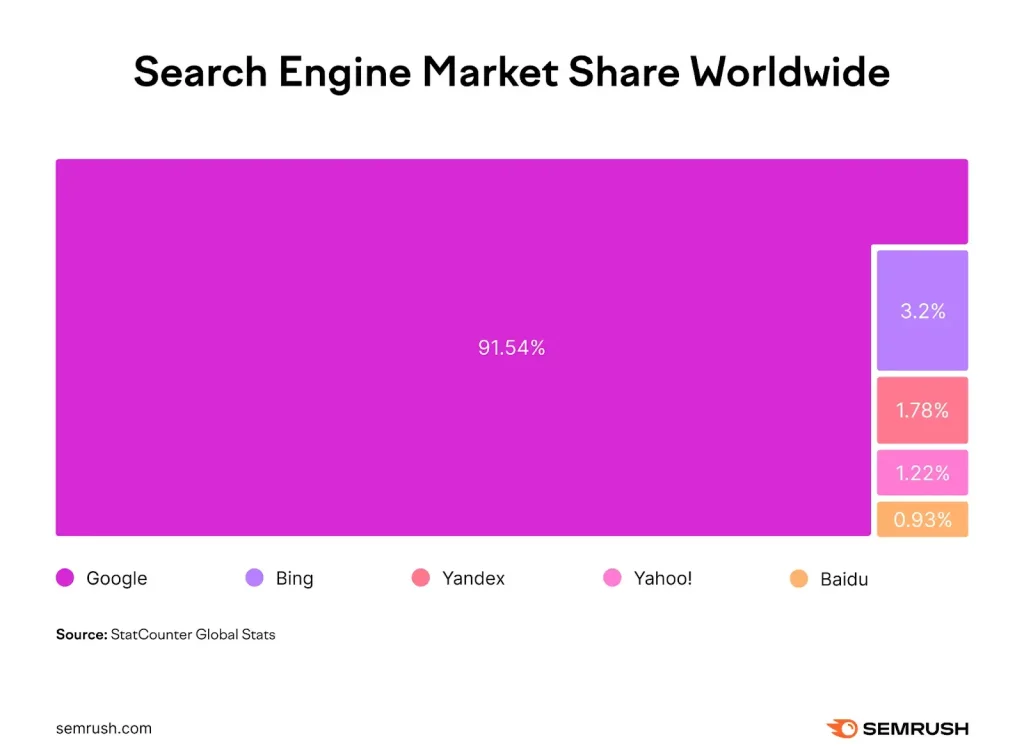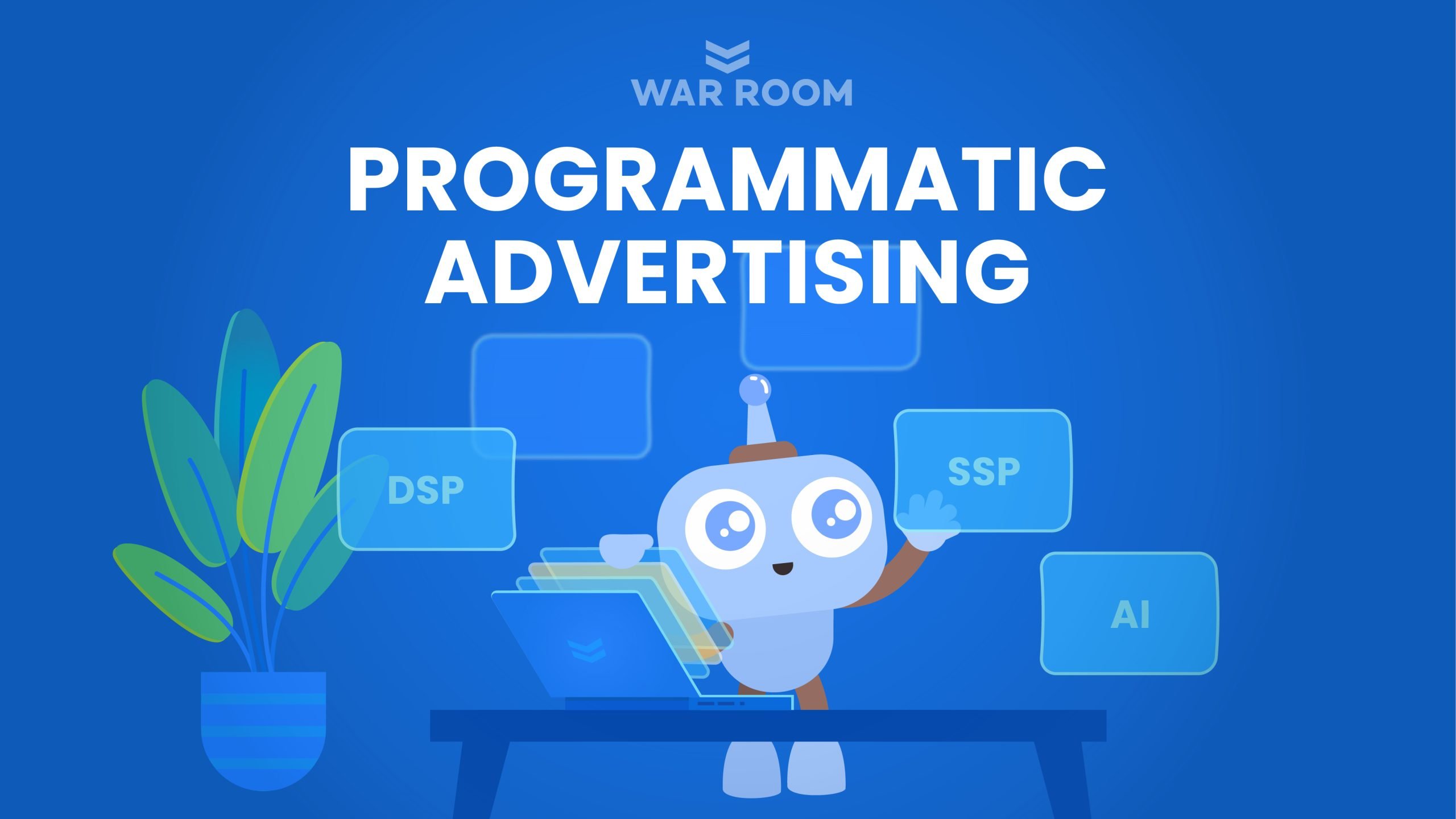What comes to mind when you hear the word ‘artificial intelligence‘? It immediately conjures images of bots thinking and working like humans. However, AI comes in different types and forms.
But did you know AI technology has recently penetrated the search industry?
Enter Google AI search, the integration of AI technology into the most popular search engine in the world. It seeks to improve the search accuracy, efficiency, and personalization. The ultimate goal is to enhance the user experience (UX) on the search engine results pages (SERPs).
Sure enough, it’s gradually transforming how we use Google and find information via the web.
This blog will what you need to know about Google AI search. Learn more about the rise of AI in the search industry and its impact on SERP. More importantly, discover the top Google search trends to expect with the AI integration. Here’s what we’ll cover:
- The Rise of AI in Search
- History & Current State of Google Search
- The Rise of Google AI Search
- What is Google AI Search
- The Impact of Google AI on SERP Users
- How Google AI Search Could Potentially Impact Your Advertising
- How Google AI Search Could Potentially Impact Your SEO
- Google Search Trends to Expect with Generative AI
- Conclusion
Feel free to skip to a section that best interests you, or read on!
The Rise of AI in the Search Industry
Who doesn’t know Google? Of course, it’s the most popular search engine in the world, accounting for nearly 92% of the global search engine market. Its closest competitor, Microsoft’s Bing, only has a market share of more than 3%. That’s quite the difference!
Specifically, Google comprises almost 83% of the desktop search engine market and over 95% of the mobile market share. It allows you to search for data via the Internet. All it takes is to type in the search engine field using specific keywords, and the platform will provide you with tons of relevant information.
Let’s look at the evolution of the Google search engines below.
History and Current State of Google Search
To understand what Google offers as a search engine, here are some of its key milestones before the recent AI introduction:
- 1998: Google was formed and launched its search engine.
- 2000: It introduced an online advertising platform called AdWords.
- 2004: It made its initial public offering.
- 2007: It launched Universal Search, having combined various content forms on SERP.
- 2011: The Panda upgrade targeted low-quality content.
- 2012: The Penguin upgrade was released to reduce web spam.
- 2013: The Hummingbird update enhanced query comprehension.
- 2015: The Mobilegeddon upgrade prioritized mobile-friendly websites.
- 2015: Google introduced the machine learning algorithm RankBrain.
- 2019: The BERT upgrade improved natural language processing.
- 2021: It introduces the MUM AI model for complicated inquiries.
The Rise of Google AI Search
Artificial intelligence (AI) is essentially the simulation of human intelligence into digital tools and technologies. Examples are chatbots, interactive voice response (IVR) systems, and generative AI, such as ChatGPT and Gemini.
According to Statista, the global AI market will reach $305.90 billion in 2024 and $738.80 billion by 2030 at a 15.83% compound annual growth rate (CAGR). This means that AI’s impact on sectors like the search industry will continue to grow and expand.
AI impacts various sectors, which applies to the search industry as well. Since 2015, Google has already begun integrating AI technology into SERP. However, 2024 is a game-changer in the industry.
What is Google AI search?
Google AI search is a new way of searching that provides users with the most relevant information to their queries using the integrated generative AI feature. However, it’s still experimental as of the time of writing, which has begun rolling out to everyone in the United States, with more countries following suit.
Learn more about how Google AI search affects search engine users below.
The Impact of Google AI on SERP users
It’s no secret how Google constantly updates its search engine algorithms to provide relevant search results and improve the overall UX. In fact, it considers various key factors that determine its search results:
- Meaning refers to the intent behind your query. What are you looking for in the first place?
- Relevance considers content related to the search query. Are these pieces of information relevant to what you’re looking for?
- Quality focuses on the value of content pieces. Are they helpful, insightful, and informative to you?
- Usability factors in the usability of content. Is a particular content more accessible than the rest?
- Context considers your location, past search history, and search settings. Which content is the most relevant and useful to you at the moment?
AI can be such a game-changer in the search industry. It can significantly improve search engine algorithms for crawling and indexing web pages. Ultimately, it can provide users with what they exactly need based on data analytics.
That said, AI can substantially impact the following:
- Search visibility: As a business, you aim to be visible on the Internet. SEO involves optimizing your website, writing relevant content, and promoting your site on other online platforms to improve your search engine rankings. However, with AI-Google integration, it’s also best to implement AI-powered SEO to enhance your web and content visibility.
- Search traffic: Not only do you aim to boost your online visibility, but you also seek to drive traffic to your website from SERP. Understanding the Google search essentials is crucial to optimize your website and drive organic traffic. With AI-Google integration, there’s a need to align your SEO strategies with Google algorithms.
- Business revenue: Today’s Web3 SEO not only improves your search rankings and increases your website traffic but also helps build your site authority. Ultimately, it can go as far as generating leads and converting sales for your business. As a business, understand the impact of Google AI search to align your SEO strategies and maximize your income potential.
How Google AI Search Could Potentially Impact Your Advertising
1. Changing Search Queries: As people start using more natural language in their searches, like when asking questions to a voice assistant, you’ll need to adjust your ad campaigns. Consider including conversational phrases and questions as your keywords to better match these new types of queries.
2. Emphasis on Privacy and Trust: In an age where AI can target ads based on user behavior, maintaining privacy is key. Be transparent about how you use data with cookie consent banners, and ensure you’re respecting user privacy. This not only complies with regulations but also builds trust with your audience.
3. Better Targeting and Personalization: AI can help create ads that are highly targeted and personalized. Use AI tools to understand your audience’s preferences and behaviors, and tailor your ads to fit their needs and interests.
4. Continuous Testing and Optimization: The digital ad space is dynamic, especially with AI shaking things up with offerings like Demand Generation ads. Regularly testing different aspects of your ads, like images, headlines, and calls to action, to see what resonates best with your audience. Use these insights to tweak and improve your ad strategies continuously.
How Google AI Search Might Impact Your SEO Efforts
1. Content is King: With AI providing answers directly in search results, high-quality, informative content is essential. Your content should clearly answer common questions or provide valuable information that Google’s AI might pull into search result summaries.
2. SEO Adjustments for AI Comprehension: Structure your content so that it’s easy for AI to understand. Use clear headings, answer questions directly, and ensure that your content provides thorough, authoritative information on the topics you cover.
3. Anticipating User Intent: Understanding what your audience is searching for—and why—becomes even more crucial. Gear your content to meet these intents by addressing their concerns, answering their questions, and providing useful solutions.
4. Integration with Other Marketing Efforts: SEO shouldn’t stand alone. Integrate your SEO efforts with your social media, email marketing, and content marketing strategies to build a cohesive and powerful marketing approach.
5. Leverage Predictive Analytics: Use AI-driven tools to predict what topics or questions are gaining interest and might soon trend. This allows you to create or update content proactively, keeping you ahead in the SEO game.
Google Search Trends To Expect with Generative AI
AI is already present, both locally and globally. However, it shows no signs of stopping or slowing. Instead, AI technology is advancing and expanding, potentially changing the future of business.
In fact, Deloitte refers to this period as the “Age of With,” where human work is “augmented and enhanced with AI.” Consider these interesting data from two of its most recent reports:
- 60% of organizations believe AI will significantly transform their industry in the next few years.
- Almost 95% of business leaders claim AI is essential to organizational success.
With the integration of generative AI with SERP, there are Google search trends to expect this
year—and beyond. Below are some:
1. Enhancement of Natural Language Processing (NLP)
As the name suggests, NLP is a form of AI that allows human-computer interactions using natural language. Google uses NLP in its search engine algorithms to understand and interpret user searches, whether conversational or even complicated. By enhancing NLP, the search engine will be more capable of producing accurate and relevant search results for the user.
Gerald Lombardo, Head of Growth at Popl, expects further NLP development in search engine algorithms. “Due to AI-powered NLP, Google Search will become more intuitive and user-friendly. Such a development will considerably increase the accuracy of search results, therefore improving the entire user experience.”
2. Personalization of Search Engine Results Pages (SERP)
Web users have become more critical than ever as they demand a more personalized experience. They want search engines to provide them not only with relevant results but also customized experiences. As such, expect AI to pave the way for SERP personalization by modifying search results to specific users based on behavior, preferences, and context.
Thomas Medlin, Co-founder at JumpMD, emphasizes the power of personalization brought on by AI integration on SERP. “AI-powered personalization in search results will make information discovery more efficient and relevant. It provides search results closely aligned with individual needs and preferences. This tailored approach can dramatically improve the user experience.”
3. The Rise of Voice and Visual Search
It’s easy to see online users use text keywords typed on the search engine fields to look for information. However, in recent years, the industry has witnessed the gradual use of voice and visual search trends. Still, expect the wide adoption of these trends, allowing searchers to use verbal instructions and visual images made plausible through AI integration.
Tim White, Founder of milepro, predicts the use of voice and visual search in the coming years. “AI advancements will change how we interact with search engines using voice and allowing visual search. These AI-driven improvements will make the search for information more efficient and diverse, increasing user ease and accessibility.”
4. AI-powered Content Generation
The most recent AI development in the search industry is generative AI, paving the way for AI-powered content generation. The process automatically creates high-quality content, such as articles, summaries, and product descriptions. Look at the example below of what the Google search engine generates using AI overview:
Tom Golubovich, Head of Marketing and Media Relations at Ninja Transfers, highlights the value of AI-powered content generation on SERPs. “Imagine asking Google some queries and generative AI immediately provides content-generated answers instead of having to click prospective web pages or content pieces. AI truly transforms how we create and consume information, starting with the search engine.”
5. Improvements in Local Search
Google has allowed extensive use of its search engines for local searches. For example, patients looking for urgent care centers or walk-in clinics rely heavily on Google as it provides them with localized results. However, with AI integration, expect significant local search improvements for more accurate and relevant search results based on the user’s geographical location.
Jerry Han, CMO at PrizeRebel, believes that AI integration on SERP makes local search more accurate, targeted, and efficient. “This feature makes it easier for users to find nearby services, businesses, or information. It allows consumers to find what they need right around the corner. This technology indeed benefits both users and local businesses.”
6. Enhanced User Experience (UX)
The ultimate goal of AI integration with SERP is to enhance the user experience. How is this possible? AI improves Google algorithms, making the search engine more intuitive, responsive, and positive for users looking for information. Further AI enhancements will result in faster load times, more relevant results, and a more seamless, engaging user search experience.
Sturgeon Christie, CEO of Second Skin Audio, sees the benefits of AI integration on SERP for UX. “AI is dramatically improving the user experience by making search interactions more intuitive and rewarding. These innovations result in faster, more relevant results, making the search process more efficient and enjoyable for the users.”
7. Integration with Emerging Technologies
AI developments show no signs of stopping and slowing down. Expect its integration with new and emerging technologies in the next few years. Think of the possibility of extended realities (XRs) like augmented reality (AR), virtual reality (VR), and mixed reality (MR) on SERP. This scenario is just one example of how AI can merge with other digital tools and technologies to improve UX.
Phil Strazzulla, Founder of SelectSoftware Reviews, foresees the possibility of AI and XR integration on SERP. “The combination might change the search experiences into immersive and interactive adventures on SERP. These developments provide users with a more engaging and informative means of accessing information.”
Final Words
There’s no denying AI’s impact on various sectors, including the search industry. The introduction of generative AI on SERP is a perfect example. It will transform how we use Google and find information online.
As a business, familiarize yourself with the Google search trends, given the AI integration. Consider those outlined above, from the enhancement of NLP to the improvements of UX, albeit the Google AI search is still experimental.
Know what to expect and understand how they work as early as now. By doing so, you can capitalize on the Google AI search for your business to gain a competitive advantage!










